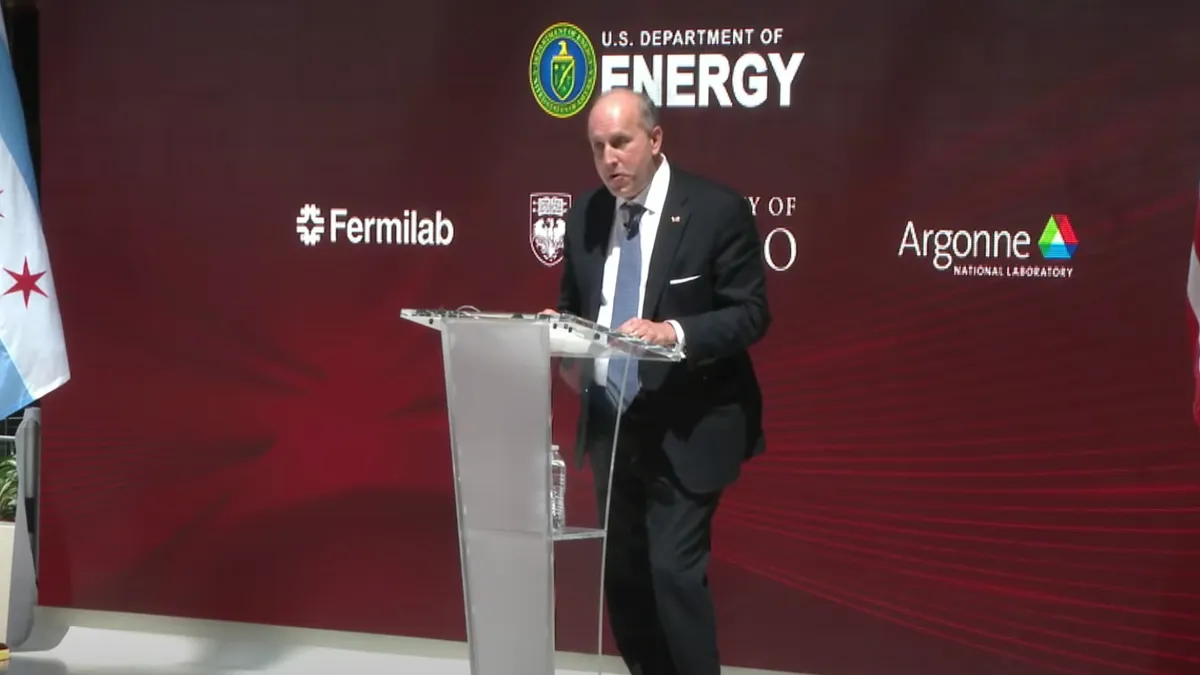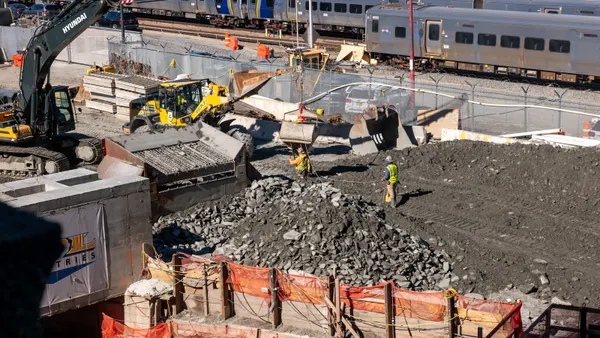Dive Brief:
- The U.S. Department of Energy (DOE) unveiled a report that details a strategy for developing a national quantum internet, which would use quantum mechanics to transmit information securely and quickly.
- The DOE credits the Chicago region with laying crucial groundwork for building a quantum internet, including creating a 52-mile quantum loop network that helps researchers test the mechanics of this type of technology.
- The "very ambitious" quantum internet project will "build a fundamentally new kind of internet, a fundamentally new way in which we communicate with each other and share information. It's something that cannot be done with the existing internet," David Awschalom, University of Chicago professor and senior scientist at Argonne National Laboratory, told Smart Cities Dive. The quantum internet is still in the research phase and a prototype could emerge in the next decade.
Dive Insight:
Awschalom explained that when the U.S. Department of Defense first invented the internet 50 years ago for internal use, developers had no idea how pervasive and influential it would be in modern society. He anticipates the quantum internet will bear similar gravitas and prove transformational across the U.S. and the globe in the coming decades.
The quantum loop developed in the Chicago region originates at Argonne National Laboratory in the suburb of Lemont, IL. The intention is to connect to Fermilab, in the suburb of Batavia, IL, and then expand to the other 17 national laboratories, Awschalom said. Network nodes likely will build out from the labs into surrounding metro areas over time.
Like the rollout of the traditional internet, the quantum internet likely will remain internal to federal government entities for a time while the technology is developed and perfected. Unlike the current internet's development, though, the quantum internet effort is collaborative. National laboratories, research institutions and industry all are working together from the start on its development.
Quantum physics is at the heart of this technology. It focuses on examining matter on an incredibly small scale — down to individual electrons on an atom. "Nature behaves differently at the atomic scale. When we look at data today, it's a 1 or a 0. When we look at quantum data, it can be 0 and 1 simultaneously," Awschalom said. That means particles can exist in a number of states at the same time and even looking at them fundamentally changes them. Scientists refer to these unusual matter properties and space sharing as "entanglement."
Entanglement contributes to the quantum internet's ability to deliver information rapidly because so many things can occur simultaneously. It also significantly boosts security and makes the quantum internet "virtually unhackable," he said. For example, it would be difficult for unintended parties to "look at" information sent via this technology, but if they did, it would be easy to see that the data was tampered. This makes quantum internet a particularly attractive prospect for industries that transfer sensitive information such as banking, healthcare and national security.
It will take a number of years for collaborators to finish developing and scaling the quantam internet. Like the original internet creators, scientists currently have only an inkling of the impact a quantum internet will have and what it can be used for, Awschalom said, but it is anticipated to present a plethora of applications and benefits for cities.
For starters, it would enable production and use of more sensitive sensors, which cities already use for a variety of purposes from traffic management to environmental monitoring.
"This technology allows you to build extraordinary sensors. It would allow cities to monitor things like water levels, pollution levels, the behavior of the energy grid and how to rebalance energy distribution very efficiently," Awschalom said.
It would link quantum computers, which are good at determining optimization for complex problems — "a really hard problem to solve mathematically," he said. Examples include determining the most efficient transportation routes or optimizing any resources that have to be distributed efficiently such as energy, water or packages.
"These are very complex problems that cities have to face and distribute resources efficiently. I think they would be significant users of this [quantum internet] infrastructure," Awschalom said.
The quantum internet would also operate through fiber optic communication lines. Operating it at scale involves ensuring enough fiber lines are installed across the country. That might seem like a large task, but a similarly large investment already is underway with installing equipment for another communication transition: 5G. Plus, thousands of miles of "dark fiber" cable already are installed across the country but are not in use. Service providers could simply activate this infrastructure for the quantum internet rather than dealing with the cost of installing new fiber.
Once the quantum internet becomes available for public use, two internets will likely exist for a period of time. Who uses which one and how has yet to be determined. Most other major global nations — Canada, China, France, Germany, Japan, Russia and South Korea, to name a few — also are working on quantum internet technology. The technology eventually should enable fast, secure transactions across the world.













